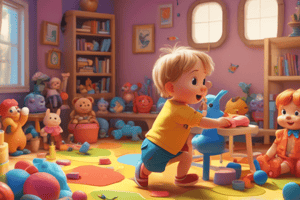Podcast
Questions and Answers
What are the key characteristics of the infancy stage (birth to age two)?
What are the key characteristics of the infancy stage (birth to age two)?
Trust development, basic motor skills, recognition of objects and people, social interaction, forming attachments.
Describe the developmental milestones typically observed in early childhood (ages two to four).
Describe the developmental milestones typically observed in early childhood (ages two to four).
Increased curiosity, imaginative play, language development, symbol use, identity awareness, social interaction.
What changes and advancements occur in children during middle childhood (ages four to eight)?
What changes and advancements occur in children during middle childhood (ages four to eight)?
Greater independence, enhanced cognitive abilities, acquisition of academic skills, social cooperation and competition.
How does social interaction influence development during the infancy stage?
How does social interaction influence development during the infancy stage?
What role does imaginative play play in early childhood development?
What role does imaginative play play in early childhood development?
How do children's cognitive abilities evolve during middle childhood?
How do children's cognitive abilities evolve during middle childhood?
Why is language development a significant aspect of early childhood?
Why is language development a significant aspect of early childhood?
Explain the importance of social cooperation in middle childhood.
Explain the importance of social cooperation in middle childhood.
How does the development of trust impact infants during the early stages of life?
How does the development of trust impact infants during the early stages of life?
What cognitive advancements are typically observed in children aged four to eight?
What cognitive advancements are typically observed in children aged four to eight?
Study Notes
Early Childhood Education is an essential component of a comprehensive educational system that focuses on children from birth to eight years old. This period is characterized by rapid growth and change in cognitive, social, emotional, and physical domains. Understanding these developmental stages helps educators design effective programs tailored to each stage's unique needs.
Birth to Age Two: Infancy
During infancy, babies develop trust through interactions with caregivers. They also learn basic motor skills like crawling and walking, and begin to recognize objects and people. Social interaction plays a key role in this stage, where babies start to form attachments and respond to familiar faces.
Ages Two to Four: Early Childhood
In early childhood, children exhibit increased curiosity and the ability to engage in imaginative play. They start developing language skills, using symbols to communicate, and becoming aware of their own identity. Social interactions become increasingly important, leading to the development of social skills like sharing and turn-taking.
Ages Four to Eight: Middle Childhood
Children in middle childhood exhibit greater independence and self-control. Their cognitive abilities progress rapidly, allowing them to understand complex relationships between objects and events. This stage also sees the acquisition of academic skills, particularly reading and writing. Socially, children learn to cooperate and compete effectively within group activities.
Early childhood education aims to provide an environment that supports these stages of development. It focuses on the whole child and their unique needs while also introducing them to essential skills like reading, writing, math, and problem-solving. This approach ensures that children are well prepared for future academic success and personal growth.
Studying That Suits You
Use AI to generate personalized quizzes and flashcards to suit your learning preferences.
Description
Learn about the key developmental stages in early childhood education from birth to eight years old. Explore how children progress in cognitive, social, emotional, and physical domains, and how educators can design effective programs tailored to each stage's unique needs.




